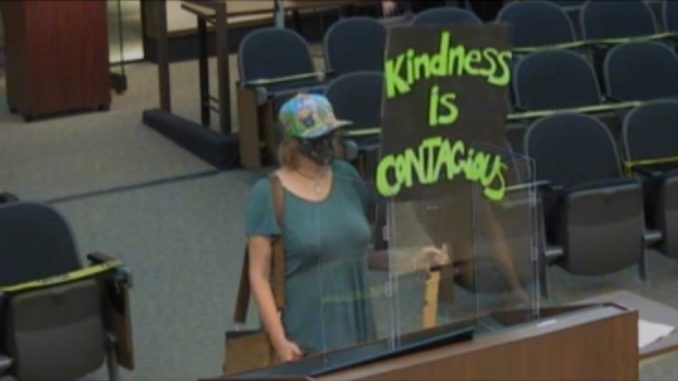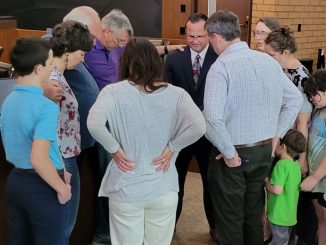
Local opponents of commercial cannabis added a new argument to their repertoire as the Chico City Council discussed allowing such businesses on Tuesday (Aug. 25). In addition to claims that pot shops allegedly contribute to crime and addiction rates in areas they’re allowed, some online and in-chamber commentators asserted that the council shouldn’t be discussing the issue at all during the virus crisis.
In reality, the action to approve rules to establish how such businesses would be permitted and operate in Chico was slated for a March 17 council meeting but canceled due to the outbreak. Furthermore, when California voters approved Proposition 64 four years ago—paving the way for such businesses—the then-conservative majority Chico City Council passed an ordinance prohibiting commercial operations in the city, beginning years of bickering over the issue.
“As to all of the arguments that this is bad timing … it is bad timing,” said Robyn Engel, one of 13 speakers to appear before council on the topic (speakers were allowed in chambers for the first time since March, due to COVID-19, but there is still no audience. Additionally, more than three dozen online comments were delivered via the Engaged Chico website, mostly in favor of allowing commercial cannabis). “It should have happened in 2016 when the vast majority of us voted in favor of commercial cannabis in Chico, but [former] Mayor [Sean] Morgan didn’t want that vote to be realized.”
Ultimately, the council voted 5 to 2 in favor of measures to allow commercial cannabis in Chico, with some amendments. Council members Morgan and Kasey Reynolds voted against. A second amended reading will be held next month.
Three in one
The action taken by council was to approve three separate items—a resolution and two ordinances—necessary for storefront operations to commence. Together, they constitute a comprehensive program to allow and regulate commercial cannabis activities. Included are rules establishing business permits for businesses, how permit applicants will be selected and land use regulations.
The rules are the result of hours of work by city staff and citizens on all sides of pot issues. At the urging of Vice Mayor Alex Brown, a Commercial Cannabis Advisory Committee—which included community members, cannabis proponents, and representatives from Chico State, Chico Unified School District, Butte County Health, Chico Chamber of Commerce and the Downtown Chico Business Association—began meeting in May 2019. Based partly on information and opinions gathered through that effort, the council charged city staff with composing the package of rules last November.
Regulations include that businesses be located a minimum distance from schools, and there is a limit on the total amount of storefronts allowed—one per 25 thousand members of the city’s population, with four allowed to open initially. There are no limits on the number of non-storefront retailers and other commercial cannabis businesses, including testing, manufacturing and distribution facilities.
Jessica Mackenzie, head of the Inland Cannabis Farmers Association, sat on the cannabis committee and spoke at Tuesday’s meeting. She praised the council’s perseverance and commitment through what she described as an arduous process.
“This set of ordinances is not the one that I would have written,” she said. “But that’s a good thing. It shouldn’t be the set of ordinances that any one person would have written. It’s a set of compromises, to the benefit of the community.”
As is always the case when it comes to hot pot topics, there were some who were not pleased with those compromises. Speaker Nicole Nava decried the potential for more crime and took particular aim at Brown.
“Where you have drugs and where you have a cash business you have crime,” Nava said. “You are making it difficult for our Chico PD already to do their jobs, and this is going to add more layers to that.
“Ms. Brown, you have worked for this harder than the drug pushers in the Tenderloin of San Francisco,” she continued. “I’m ashamed of this city.”
Jeff Creed warned that having commercial cannabis in downtown would negatively “change the culture” of Chico
“Those businesses downtown … If they want to add this, that’s fine, but they don’t need me shopping there.” Creed said. “I don’t need to be sitting there at dinner and have somebody blow a puff in my face. I don’t need to have somebody puff in my face as I walk to my car.”
Creed’s comments prompted City Attorney Andrew Jared to explain that, due to zoning regulations included in the new rules, there will be no commercial cannabis businesses located downtown.
Before the vote, Morgan reiterated his criticism of the city’s plans for pot operations, but backhandedly acknowledged that he’s glad the long conversation has reached a conclusion.
“I can finally stop carrying these papers around and repeating myself,” Morgan said before citing studies claiming—among other things—that 1 in 3 homeless people in Denver, Colorado, said they moved to the city because of legal pot. “That’s why I am voting ‘No’ now … but I am relieved I won’t have to be doing it again.”




Thank you for the coverage. It’s nice to have a victory like this, yet we still need to push for this to move forward – obstructionism naturally continues. (Ironically, the haters need and will probably benefit more from this than anyone).
Unfortunately, council members are much like cops; if you give either onr power, they will power up. One aspect of policing that seems to be ignored is that the legalization of assassins attracts assassins. Same with board members, they are often malcontents with one idea how to save the world and they desperately cling to their power.